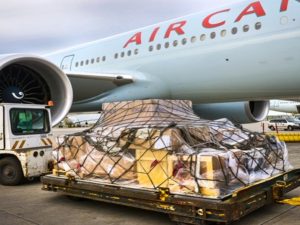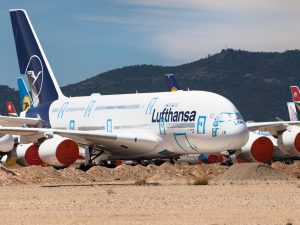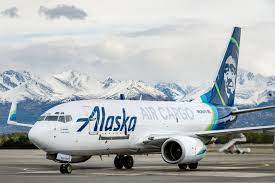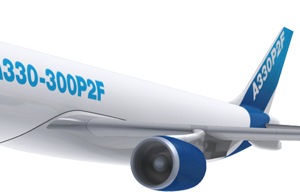Air Canada announced today that Bolloré Logistics has become the first Air Canada Cargo customer to join the Leave Less Travel Program, which offers corporate and cargo customers effective options to offset or reduce their greenhouse gas (GHG) emissions related to business travel or freight transportation, and reduce their carbon footprint. Bolloré Logistics has agreed to compensate a significant portion of its GHG emissions associated with its projected shipments w Air Canada announced that Bolloré Logistics has become the first Air Canada Cargo customer to join the Leave Less Travel Program, which offers corporate and cargo customers effective options to offset or reduce their greenhouse gas (GHG) emissions related to business travel or freight transportation, and reduce their carbon footprint. “We are very pleased to welcome Bolloré Logistics as our first cargo customer to participate in Air Canada’s Leave Less Travel Program. Addressing climate change in aviation requires a multifaceted approach, together with the united efforts of many stakeholders. The commitment of companies like Bolloré Logistics is a testament that environmentally-innovative business programs are mutually possible, further helping the aviation sector to build a long-term, sustainable industry,” said Jason Berry, Vice President, Cargo at Air Canada. “At a time when climate awareness is at the heart of the strategy of many companies, Bolloré Logistics is proud to join a program that is financing the future of low-carbon air industry. Through this initiative with our partner Air Canada, we contribute our scope 3 CO2 reduction targets and offer more sustainable transport solutions to our clients,” said Patrick Lafrance, Managing Director Canada at Bolloré Logistics.
Read More »Lufthansa Cargo enhances cargo capacity, joins CargoAi
Lufthansa Cargo has launched a pilot program in three European countries ahead of its plan to offer its capacity worldwide through the online platform CargoAi. As part of the pilot, users in the Netherlands, Italy and Spain will have access to routings and capacity information on all Lufthansa Group airlines serving those countries. The carrier said general and express cargo can now be booked on Lufthansa, Austrian, Brussels, Eurowings, or SunExpress. “This initial roll-out is a pilot that will run for the next two to three months, during which CargoAi and Lufthansa Cargo fine-tune their preparations for a global go-live, should the technical pilot run smoothly,” the announcement said. CargoAi noted that Lufthansa Cargo will benefit from an easy-to-use, customized e-booking system, allowing the carrier to optimize the efficiency of its forwarding process. It will also benefit from the promotion of its services to the more than 5,000 freight forwarders across 103 countries who regularly use CargoAi’s marketplace. “We are honoured that Lufthansa Cargo, one of Europe’s largest air cargo carriers, has chosen to market its capacities on our platform,” said Matthieu Petot, CEO of CargoAi.
Read More »Cargojet, UPS renew MoU to enhance global cargo ops
Canadian cargo airline Cargojet has renewed and extended its Air Cargo Services Agreement with United Parcel Service (UPS) Canada for an additional five-year term. The current agreement was due to expire on July 1 2025 and the new agreement is extended to December 31 2030, said official release. Cargojet continues to provide a Canada-wide air cargo service for UPS, while Cargojet’s domestic overnight network provides additional capacity and long-term stability to UPS, said Cargojet. Ajay Virmani, chief executive of Cargojet, said, “Cargojet is extremely pleased to have successfully renewed the domestic Air Cargo Services Agreement with UPS Canada. Cargojet has been the exclusive provider of time-sensitive domestic overnight air cargo services to UPS Canada since 2003. We will continue to provide the most cost-effective, best on-time performance as well as a scalable solution to UPS.” The renewal of the agreement is a testament to the committed, hardworking, and dedicated team of professionals at Cargojet, said release.
Read More »Abu Dhabi Airports joins Pharma.Aero to enhance Life Science, MedTech in ME
Abu Dhabi Airports has joined Pharma.Aero as a strategic member representing the Middle East. Pharma.Aero is the global membership network for life science and medtech manufacturers, certified cargo communities and airport operators. The collaboration with Pharma.Aero builds on Abu Dhabi’s growth as a global healthcare and life sciences hub, and the success of the HOPE Consortium, an Abu Dhabi-led public private partnership committed to overcoming the challenges of vaccine distribution and logistics. Jamal Salem Al Dhaheri, managing director and chief executive of Abu Dhabi Airports said, “We are pleased to join Pharma.Aero as a strategic partner for the Middle East, representing the global cross-industry network of Life Science and MedTech air cargo industry stakeholders in the region. Along with Etihad Cargo, we look forward to collaborating with industry leaders to contribute to the overall development of the pharmaceutical supply chain.” Abu Dhabi Airports is set to pursue major air cargo infrastructure expansion projects with a strong focus on products capable of efficiently handling time and temperature-sensitive cargo, including those from within pharmaceuticals and life science.
Read More »Envirotainer invests, expands capacity for cold chain shipments
Envirotainer has expanded its production site in Rosersberg, north of Stockholm. “This is in response to incredibly high demand for secure, temperature-controlled units to transport vital medicines around the globe. This year alone, the business will add annual shipping capacity of ~200 million more doses. By the end of 2022, Envirotainer will be capable of shipping over one billion vials per year,” said an official release. The site is the largest in the world in terms of output, able to build more units each year. It has also been designed to allow further expansion in the future, the release added. Envirotainer is the global market leader in secure cold chain solutions for shipment of pharmaceuticals. “The Envirotainer fleet covers more than 2,000 pharmaceutical trade lanes in over 100 countries and 300 airports. Its services help pharma companies meet the strictest requirements in pharmaceutical air freight and include the new Releye® RAP and RLP models, which are the largest and most advanced of their type on the market, combining high capacity with superior features,” the release added.
Read More »Alaska Air Cargo, Boeing partners to convert two 737-800F
Alaska Air Cargo has partnered with Boeing to convert two 737-800 Freighters to add to its dedicated freighter fleet. “The conversion work will be done at Cooperativa Autogestionaria de Servicios Aeroindustriales (COOPESA) in Costa Rica. The two 737-800BCF aircraft will increase the Alaska Air Cargo freighter fleet from three to five aircraft that are dedicated to serving the state of Alaska,” said a release from Alaska Airlines. “Fleet expansion positions our growing cargo business to meet increased demand that we see from industry and consumers,” said Adam Drouhard, managing director, Alaska Air Cargo. He added, “The 737-800 aircraft provides 40 percent more load space than our current 737-700 freighters, essentially doubling Air Cargo’s total freighter lift capacity. We look forward to getting these 737-800s into service to support Alaska’s supply chain and connect cargo to over 100 cities we serve across North America.”
Read More »DB Schenker launches CO2-neutral air freight solutions
DB Schenker is all set to launch the next chapter of greener transport in air freight, further extending its portfolio of climate-friendlier logistics solutions. “With immediate effect, customers can choose Sustainable Aviation Fuel (SAF) for their air transport to anywhere in the world and independent of the type of aircraft or airline used. Via virtual allocation of the biofuel, it is possible to avoid up to 100 percent of CO2 emissions,” said an official release. Jochen Thewes, CEO, DB Schenker said, “We are very proud of the game-changing pioneer project we started with our trusted partner Lufthansa Cargo. Today, we take the next step by starting a global green air cargo network. We have purchased massive volumes of biofuel to push the decarbonisation of our industry. Customers of DB Schenker can now virtually book SAF on all trade lanes to thousands of airports. This new flexibility is a success factor and good for the climate. Every ton of biofuel counts.”
Read More »New cold storage facility for pharma, cross border trade
FedEx Express has opened new cargo facility for seamless cross-border trade, e-commerce growth and pharma logistics at Incheon International Airport in South Korea. The FedEx Gateway spans 23,395 sq. mt, more than double the size of the previous facility, and is equipped with 78 conveyor belts and an advanced automated sortation system that can sort up to 12,000 packages per hour, doubling the previous sorting capacity. It also includes a 15,207 sq m warehouse that can store up to 40,000 packages, said release. With 31 weekly flights, the new cold store facility connects Korea to over 220 countries and territories through the FedEx global network. Kawal Preet, president of the Asia Pacific, Middle East, and Africa (AMEA) region at FedEx Express said, “With South Korea tracking as the fourth biggest exporter in Asia last year and the world’s fifth-largest e-commerce market, the new Incheon Gateway will further boost our already extensive network to create possibilities for customers across the region. As trade lanes continue to diversify, businesses particularly across the North Pacific region will benefit from this newly opened facility as they continue to harness the full potential of global trade opportunities.” The new gateway’s cold storage area is now five times larger, to facilitate the transport of cold-chain shipments, including samples for clinical trials and healthcare products such as vaccines as well as perishable or temperature-sensitive items.
Read More »Pact inked to reduce carbon emissions for air freight
CargoAi and Finland-based oil refining company Neste have entered into a partnership to offer freight forwarders options to reduce their carbon emissions from air cargo transportation. As of November, CargoAi is offering freight forwarders the option to purchase Neste’s sustainable aviation fuel (SAF) when booking cargo transport, the companies said. This can be done either after a booking is confirmed or when the cargo is being tracked, they said. The offering will “further encourage forwarders to enter into discussions with their own clients about what is needed for the industry to move forward towards reaching the industry’s net zero targets together”, said Matthieu Petot, chief executive of CargoAi. “We are also enabling access for smaller freight forwarding companies in 110 countries to purchase SAF in smaller quantities,” he added. SAF is a key element in helping to reach aviation industry’s goal of net-zero carbon emissions by 2050. While air cargo has historically been considered less environmentally friendly than other transport methods, it is taking steps to develop more sustainable solutions by investing in fleet modernisation, fuel efficiency, SAF and carbon compensation initiatives. The partnership between Neste and CargoAi will allow the companies “to accelerate and broaden the utilisation of sustainable aviation fuel into new markets”, said Neste’s Jason Reichow.
Read More »Deal signed to convert A330 aircraft to serve global market
Airbus freighter conversions unit EFW and Aircraft Maintenance and Engineering Corp (Ameco) have announced a new collaboration on Airbus passenger-to-freighter (P2F) conversions. Under the collaboration, Ameco will carry out P2F conversions as a third-party service provider for EFW’s A330P2F programme. Conversions will be carried out at Ameco’s facilities in Chengdu, China, with the first induction of an A330 aircraft scheduled in 2023. Ameco, the largest provider of MRO services for aircraft in China, and EFW announced the partnership at Airshow China 2022. Jordi Boto, CEO of EFW said, “We are very pleased to gain a renowned partner in China through our latest collaboration with Ameco, which is well experienced in freighter conversions. The partnership will support the strategy in positioning our freighter conversion programmes as a solution of choice as well as cementing our strong presence in China, which is one of the largest and fastest growing aviation markets in the world.” Said Lun Chen, CEO of Ameco: “We look forward to cooperating with EFW to support the market demand and to promote the air cargo industry development. Conversions have always been a strategic product of Ameco. This cooperation will expand the P2F market and provide better service to our customers.” EFW’s family of Airbus P2F programmes: A320P2F, A321P2F and A330P2F, is developed in collaboration with ST Engineering and Airbus, with EFW holding the Supplemental Type Certificate (STC) and leading in the overall programmes as well as the marketing and sales efforts.
Read More » Cargo Breaking News
Cargo Breaking News








